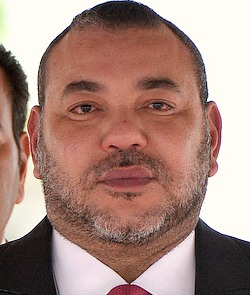 The Kingdom of Morocco (or "Morocco" for short) is a North African country bordering the North Atlantic Ocean and the Mediterranean sea between the Republic of Algeria and the Western Sahara (Morocco administers most of the disputed regions of the Western Sahara).
The Kingdom of Morocco (or "Morocco" for short) is a North African country bordering the North Atlantic Ocean and the Mediterranean sea between the Republic of Algeria and the Western Sahara (Morocco administers most of the disputed regions of the Western Sahara).
Morocco is a constitutional monarchy with an elected parliament. The King of Morocco holds vast executive and legislative powers including the power to dissolve the parliament.
According to the 2021 World Bank Developement Indicators, the Kingdom of Morocco has a total land area of 446,550 squared kilometers (about 250sq km of which is covered by water) with about 1,835km of coastline. Just about 19% of Morocco's official total land area remains arable (land good for farming).
The Kingdom of Morocco remains the only African country not a member of the African Union (formerly known as the "Organization of African Unity" or O.A.U). Morocco unilateral withdrew from the African Union on November 12, 1984 over the admission of the Sahrawi Arab Democratic Republic (SADR) in 1982 by the African Union as a full member.
The Kingdom of Morocco has an estimated population of 39 million people with the population growth rate hovering around 1.22%. About 58% of Morocco's total population lives in urban areas in major cities and towns such as Casablanca, Rabat and Fes. Casablanca, Morocco's largest and most populous city, has a metropolitan area population of about 3.5 million people). Rabat, the capital of the Kingdom of Morocco, has an estimated population of 600,000 people. Fes, the 2nd largest city in Morocco today, contains about 1.1 million people. Marrakesh (estimated population of 940,000 people), Tangier (estimated population of 960,000 people), Meknes (estimated population of 650,000) and Agadir (estimated population of 500,000) are some of the other major cities and towns in Morocco today.
Although Morocco is home to several groups of people, the Arab-Berbers make up about 99% of the total population. Also, just like in most other North African countries, Islam remains the most dominant religion in the Kingdom of Morocco with about 99% of the total population being Muslims. Christians, Jews, and other religious groups make up the remaining 1% of the total population.
Modern Standard Arabic and Standard Moroccan Berber are the two official languages of the the Kingdom of Morocco. However, French (spoken by about 36% of the population) is the language often used in business, government and diplomatic communications in Morocco today. English (spoken by about 14% of the population), Spanish (about 4.5% of the population) and several other local and foreign languages are also used in Morroco today.
Just like its neighboring countries, the Kingdom of Morocco is blessed with abundance of natural resources such as phosphates, iron ore, manganese, zinc, salt, fish, lead, etc.
However, despite the abundance of both natural and human resources, the Kingdom of Morocco just like most other African countries today, faces so many economic, social, environmental and developmental challenges including poor education system and low adult literacy rates, poor healthcare structure (especially in the rural areas), rampant corruption, etc.
Although the Kingdom of Morocco has witnessed great improvement in its literacy rate, Morocco's current literacy rate still falls below expectation. According to UNESCO, Morocco currently has a literacy rate of 73. 75% which is a huge improvement from 55.15% in 2008. However, Morocco's current female literacy rate hovers around 64.59% which is very bad compared to most countries today.
Morocco has a GDP per capita income of about $3748 and is classified as a "lower middle-income" country by the World Bank and the IMF. In other words, Morocco is just a step above "low-income" but is still poor and developing.
Obesity remains a major health problem in Morocco. In 2009, several Moroccans (about 16% of the total population) were found to be severely obese by the World Health Organization.
Morocco has a very low HIV/AIDS adult prevalence rate of < 0.1% which is better than in most other African countries. However, about 21,000 people were living with HIV/AIDS in 2019 (with about 1,200 deaths recorded) according to UNAIDS.
Desertification (caused mainly by the spreading of the Sahara desert), deforestation (the rampant cutting down of trees), soil erosion (resulting from farming of marginal areas, overgrazing of farm animals, industrial and agricultural runoffs, etc.), improper sewage disposals (this contaminates water supplies in some areas), siltation of reservoirs, oil pollution of coastal waters (mostly caused by industrial waste materials), etc. remain some of the major environmental problems facing Morocco today.
